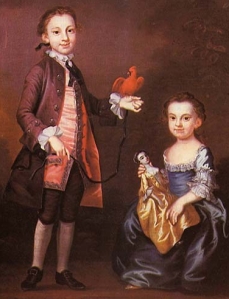 “My friends and I might still be 11, and we might still be in elementary school, but we know . . . that we have seven short years until we too have the right to vote.”[1] Speaking at the March for Our Lives event, 11-year old Naomi Wadler eloquently reminded us that childhood is ephemeral. Since they are future voters, she warned Capitol Hill to take the words, emotions, and pleas of children seriously. In many ways, she was also speaking to Florida State Representative Elizabeth Porter who recently exclaimed, “The adults make the law because we have the age, we has [sic] the wisdom, and we have the experience.”[2] For many like Rep. Porter, there has been something disturbing in this moment of youth activism. It cuts to the core of social stability based on the patriarchal family order—that children are subordinate, passive members of society. We inherited this idea from the eighteenth-century revolutionary era, a point in time when age became a main determinant in who could be considered a citizen and an adult. Continue reading
“My friends and I might still be 11, and we might still be in elementary school, but we know . . . that we have seven short years until we too have the right to vote.”[1] Speaking at the March for Our Lives event, 11-year old Naomi Wadler eloquently reminded us that childhood is ephemeral. Since they are future voters, she warned Capitol Hill to take the words, emotions, and pleas of children seriously. In many ways, she was also speaking to Florida State Representative Elizabeth Porter who recently exclaimed, “The adults make the law because we have the age, we has [sic] the wisdom, and we have the experience.”[2] For many like Rep. Porter, there has been something disturbing in this moment of youth activism. It cuts to the core of social stability based on the patriarchal family order—that children are subordinate, passive members of society. We inherited this idea from the eighteenth-century revolutionary era, a point in time when age became a main determinant in who could be considered a citizen and an adult. Continue reading
Tag Archives: consent
CFP: Consent in Early America, 1600-1900
 What does it mean to give consent? Or to withhold it? In what situations is it asked for? When isn’t it? And why? These are questions that most historians of early America face some time, some way or another. But the range of uses of consent is vast, from the many senses of government through relations of labour, exchange, sex, and kinship. Next March at the Rothermere American Institute in Oxford, Kathryn Olivarius and I will hold a conference with the aim of drawing connections and patterns across these disparate realms. Continue reading
What does it mean to give consent? Or to withhold it? In what situations is it asked for? When isn’t it? And why? These are questions that most historians of early America face some time, some way or another. But the range of uses of consent is vast, from the many senses of government through relations of labour, exchange, sex, and kinship. Next March at the Rothermere American Institute in Oxford, Kathryn Olivarius and I will hold a conference with the aim of drawing connections and patterns across these disparate realms. Continue reading